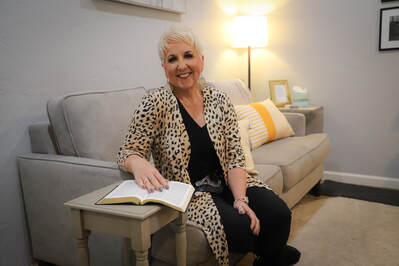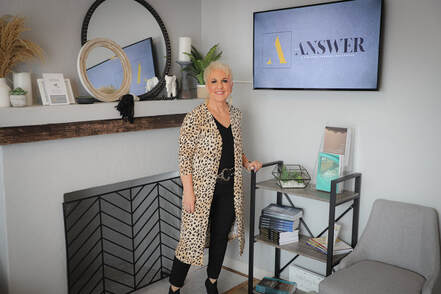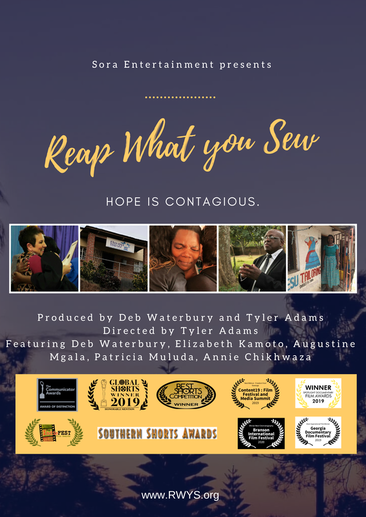Q&A with Dr. Deb Waterbury
Author of "A Crack in my Vertical"
Q: The title of your book is definitely attention-grabbing: A CRACK IN MY VERTICAL. Can you explain?
A: Most believers are familiar with the Fruits of the Spirit from Galatians 5. However, there are five of those that are not only Fruits of the Spirit but are also plumb lines for how we actually feel in our everyday lives. Those five are love, joy, peace, contentment, and harmony. Believers have at their disposal the uncompromising ability to live in all of these things, even when people and circumstances may seem otherwise. That's because those things are internally set by the Savior living in us, not the things or people operating outside of us. What I've learned is that when I am not living in one or all of those five things, I cannot blame a person or a situation. The culprit is me, and more directly, my relationship with the One and only Source of those five things—Jesus. Consequently, I've come to call these moments in my life the result of a "crack in my vertical," that is, my vertical relationship with Jesus.
Q: In one of your chapters, you say "No peace equals banjo string." What does that mean?
A: My daddy used to say that I was "strung tighter than a banjo string." I was forever stressed about performance, success, friends, and just life in general. What my daddy was seeing was a true lack of peace in my life. I was so busy looking around at others and my circumstances that I ran myself ragged trying to control all of them. That was the only way I thought I could find peace. It wasn't until I looked up at my vertical relationship with Jesus that I realized peace was available to me the entire time. Now I know that any time I have "no peace" I've gone back to "banjo string." That's when I have to repair the crack in my vertical again.
Q: Much of the information in the book comes from your experience as a biblical counselor. Talk about your counseling center and how it was formed during the pandemic.
A: A young lady who was contemplating suicide saw me on a television show and contacted me early in 2020. I began to do some one-on-one counseling with her and felt God was leading me in that direction during the pandemic. Now we have grown to the point where we have ten counselors in a 3500 square foot building, but the truth is churches should be putting us out of business. Many of the people who come through our doors are not finding connection in their local churches or are unable to find church leaders that can counsel them one-on-one. Biblical counseling is basically discipleship, which is what the Apostle Paul encouraged followers of Christ to do for one another constantly, especially within the Church.
Q: How is biblical counseling different than other types of counseling?
A: Biblical counseling begins with the Bible and brings therapy (answers) from it. Other types of Christian counseling will point people to the Bible, and that's good. Biblical counseling starts with the Bible, often in the form of Bible study with therapy, which is also good. Neither is better. They're just slightly different. I like to call Biblical counseling "intense discipleship" with a hint of therapy.
A: Most believers are familiar with the Fruits of the Spirit from Galatians 5. However, there are five of those that are not only Fruits of the Spirit but are also plumb lines for how we actually feel in our everyday lives. Those five are love, joy, peace, contentment, and harmony. Believers have at their disposal the uncompromising ability to live in all of these things, even when people and circumstances may seem otherwise. That's because those things are internally set by the Savior living in us, not the things or people operating outside of us. What I've learned is that when I am not living in one or all of those five things, I cannot blame a person or a situation. The culprit is me, and more directly, my relationship with the One and only Source of those five things—Jesus. Consequently, I've come to call these moments in my life the result of a "crack in my vertical," that is, my vertical relationship with Jesus.
Q: In one of your chapters, you say "No peace equals banjo string." What does that mean?
A: My daddy used to say that I was "strung tighter than a banjo string." I was forever stressed about performance, success, friends, and just life in general. What my daddy was seeing was a true lack of peace in my life. I was so busy looking around at others and my circumstances that I ran myself ragged trying to control all of them. That was the only way I thought I could find peace. It wasn't until I looked up at my vertical relationship with Jesus that I realized peace was available to me the entire time. Now I know that any time I have "no peace" I've gone back to "banjo string." That's when I have to repair the crack in my vertical again.
Q: Much of the information in the book comes from your experience as a biblical counselor. Talk about your counseling center and how it was formed during the pandemic.
A: A young lady who was contemplating suicide saw me on a television show and contacted me early in 2020. I began to do some one-on-one counseling with her and felt God was leading me in that direction during the pandemic. Now we have grown to the point where we have ten counselors in a 3500 square foot building, but the truth is churches should be putting us out of business. Many of the people who come through our doors are not finding connection in their local churches or are unable to find church leaders that can counsel them one-on-one. Biblical counseling is basically discipleship, which is what the Apostle Paul encouraged followers of Christ to do for one another constantly, especially within the Church.
Q: How is biblical counseling different than other types of counseling?
A: Biblical counseling begins with the Bible and brings therapy (answers) from it. Other types of Christian counseling will point people to the Bible, and that's good. Biblical counseling starts with the Bible, often in the form of Bible study with therapy, which is also good. Neither is better. They're just slightly different. I like to call Biblical counseling "intense discipleship" with a hint of therapy.
Q: One of the book chapters talks about harmony. It seems even Christians don't get along these days. How can we change that?
A: Living in harmony and unity was one of Jesus' favorite topics, and for good reason. He also loved talking about humility and service. The kicker is that you can't have any of the former without the latter. I think that's where many Christians are missing the boat. Living in harmony requires that we think of ourselves last, and that includes any idea that we get to be Judge. Instead, if Christians could spend the majority of their time thinking of ways to love and serve one another, they would have far less time thinking of ways to point out how another person is failing at life. The truth is, we all are!
Q: You have always been brutally honest about your life. How has sharing your brokenness affected your counseling?
A: One example is a young woman named Susan (not her real name) who had been in a lesbian relationship for a couple of years, and after they broke up, Susan made a profession of faith in Jesus as her Savior. Susan said she simply couldn’t believe that her relationship with her former girlfriend was a sin. Her argument was based on her love for this other woman, a love that she still deals with today, even though they haven’t been together for a while. Her heart was broken and her love was real. Consequently, she resolutely said she will never see that love as sin. When I told Susan that I had been in an adulterous affair many years ago and then asked her if she thought that adultery was a sin, she was quick to say, “Yes.” When I went on to tell her that I believed I had loved that man, I then asked her if my love for him made adultery less of a sin. She said, “No,” though more begrudgingly as she began to see my point. My husband Jeff and I now counsel couples on the brink of divorce and can tell them what we did to restore our marriage. I have also shared with people dealing with abuse about I was raped as a young girl. We all have brokenness because we live in a sin-filled world. But the essence of living in a vertical relationship with Jesus is to be restored, renewed, and healed so that we can show others how His presence is the answer to our deepest sorrows.
A: Living in harmony and unity was one of Jesus' favorite topics, and for good reason. He also loved talking about humility and service. The kicker is that you can't have any of the former without the latter. I think that's where many Christians are missing the boat. Living in harmony requires that we think of ourselves last, and that includes any idea that we get to be Judge. Instead, if Christians could spend the majority of their time thinking of ways to love and serve one another, they would have far less time thinking of ways to point out how another person is failing at life. The truth is, we all are!
Q: You have always been brutally honest about your life. How has sharing your brokenness affected your counseling?
A: One example is a young woman named Susan (not her real name) who had been in a lesbian relationship for a couple of years, and after they broke up, Susan made a profession of faith in Jesus as her Savior. Susan said she simply couldn’t believe that her relationship with her former girlfriend was a sin. Her argument was based on her love for this other woman, a love that she still deals with today, even though they haven’t been together for a while. Her heart was broken and her love was real. Consequently, she resolutely said she will never see that love as sin. When I told Susan that I had been in an adulterous affair many years ago and then asked her if she thought that adultery was a sin, she was quick to say, “Yes.” When I went on to tell her that I believed I had loved that man, I then asked her if my love for him made adultery less of a sin. She said, “No,” though more begrudgingly as she began to see my point. My husband Jeff and I now counsel couples on the brink of divorce and can tell them what we did to restore our marriage. I have also shared with people dealing with abuse about I was raped as a young girl. We all have brokenness because we live in a sin-filled world. But the essence of living in a vertical relationship with Jesus is to be restored, renewed, and healed so that we can show others how His presence is the answer to our deepest sorrows.
About Dr. Deb Waterbury:
|
Dr. Deb Waterbury is founder of The Answer Biblical Counseling Center in Tucson, Arizona as well as the online certification course for ministry leaders, The Academy of Biblical Counseling. She established the Reap What You Sew trade school for impoverished women in Malawi, Africa which was the subject of a multi-award-winning documentary that has aired on five television networks. She has authored fifteen books and Bible studies, including the #1 Amazon best-seller We are Mother Abraham and The Lies that Bind: And the Truth that Sets You Free.” She hosts two weekly shows, “Real Life with Deb Waterbury” and “Get Real with Deb Waterbury.” She acquired her Doctor of Ministry in Biblical Expository Studies from Pillsbury Seminary in St. Louis, Missouri. She currently resides in Tucson, Arizona, with her husband, Jeff who recently retired as a Lt. Colonel in the Air Force National Guard. For more information, visit http://www.DebWaterbury.com.
|
Quick facts about Dr. Deb Waterbury:
|



